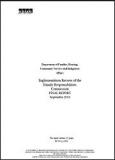Implementation Review of the Family Responsibilities Commission - 2010
Attachments

Aim of the publication
The review provides contextual background of the Cape York Welfare Reform (CYWF) and its central reform project, the Families Responsibilities Commission, (FRC), in the remote Queensland communities of Aurukun, Coen, Hope Vale and Mossman Gorge.
The review summarises key qualitative evidence from data analysis, interviews with service providers and community members and observations at conferences[1].
The FRC implementation and operation is in the first 18 months of its 3.5 year term, and while findings note that good practice principals underpin the project, change is not instantaneous and community support must be maintained.
Target audience
The FRC system can be understood as a network of regulation based on collaboration between local Indigenous leaders, existing Government authorities and services from education, child protection, housing, income support, police, courts and non-government organisations.
Content of the publication
The Welfare Reform’s program theory describes a hierarchy of changes or outcomes that are expected for individuals and families over time through the combination of Welfare Reform projects, including the FRC.
The review’s findings, when analysed with reference to the program theory, indicate that the FRC has laid its own foundations and enablers for both individual and community-level change, and it appears to be contributing to restoring Indigenous authority by supporting local and emerging leaders in Local Commissioner roles to make decisions, model positive behaviour and express their authority outside of the FRC.
There are signs of individuals responding to the drivers and incentives created by the FRC with average attendance rates of around 60-70 per cent at conferences, (comparing favourably with other conditional welfare initiatives). The review notes that the majority of clients reach agreements with the FRC about what action they should take to improve their lives.
[1] The Families Responsibilities Commission (FRC) holds conferences with individual community members who are welfare recipients and who have been identified as failing to uphold obligations around caring for children, sending them to school, abiding by the law, or abiding by public housing tenancy agreements. The FRC can refer clients to support services to address issues and barriers to change. Although its primary objective is to provide assistance, the FRC also has the authority to recommend that Centrelink manage a portion of an individual’s welfare payments
Last updated:
